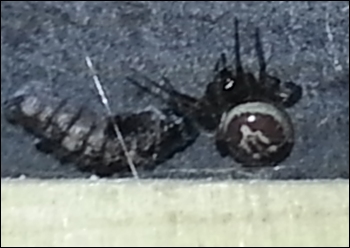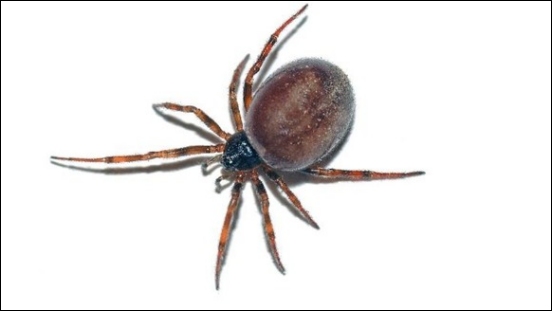Britain’s most venomous spider – the False Widow Spider – has been found at three Burnham-On-Sea and Highbridge properties this week.
Fifteen of the spiders were removed from one Burnham conservatory by pest controllers today (Tuesday).
Craig Groves from Groves Xtreme Clean told Burnham-On-Sea.com he has been called out by concerned residents to three confirmed discoveries in recent days.
The spiders have been removed from properties in Burnham’s Frobisher Close, Westfield Road and from a garden in Highbridge’s West Avenue, as pictured below.
 There have been a spate of bite reports in recent weeks across the UK and experts say the spiders are becoming more widespread.
There have been a spate of bite reports in recent weeks across the UK and experts say the spiders are becoming more widespread.
Craig told Burnham-On-Sea.com: “It’s the first time I have been called out to deal with these spiders in my many years of offering a pest control service.”
“In Westfield Road, I removed around 15 of the False Widows from a conservatory. The residents were understandably worried when they realised what the spiders were and they wanted them removed as quickly as possible.”
“In Frobisher Close, three of the spiders were seen on a window at the height of children’s heads so we quickly removed them.”
“And in West Avenue, two have been removed from an outside covered area in a garden.”
Craig says the spiders have been independently identified and then killed using approved pest control products.
He said that no-one in Burnham has been hurt, but he was also called to a Taunton home over the past week where a lady and her daughter suffered nasty bites and are recovering.
 “I would strongly recommend that people stay away from these spiders and contact a pest control firm to deal with them,” added Craig, pictured right. “Bites from the adult female spider can lead to severe swelling.”
“I would strongly recommend that people stay away from these spiders and contact a pest control firm to deal with them,” added Craig, pictured right. “Bites from the adult female spider can lead to severe swelling.”
There are six sub-species of False Widow Spiders – named for their similarity in appearance to the deadly black widow – in the UK.
The false widows are not native to this country and are thought to have been introduced in the late 1800s by ships travelling from the Canary Islands to Torquay in Devon.
A spokesman for the Natural History Museum said: “Reports from people thought to have been bitten by Steatoda nobilis describe varying levels of burning, discomfort or numbness and associated swelling in the area surrounding the bite.”
The symptoms usually disappear within one to three days and are not fatal, the spokesman added.
The species has spread across the south of England over the past 20 years and conservationist believe the changing climate could be playing a role.
.False Widow Spiders – Factfile
BITES
![]() Will usually only attack when their web is disturbed or they feel threatened
Will usually only attack when their web is disturbed or they feel threatened
Bite itself is not normally felt but is followed by ‘varying levels of burning, discomfort or numbness and associated swelling in the area surrounding the bite’
![]() As with a bee or wasp sting, the seriousness depends on the individual’s reaction to the bite
As with a bee or wasp sting, the seriousness depends on the individual’s reaction to the bite
![]() If you suspect an allergic reaction, or symptoms are more serious, you should seek medical attention
If you suspect an allergic reaction, or symptoms are more serious, you should seek medical attention
![]() Symptoms usually disappear within one to three days
Symptoms usually disappear within one to three days
NUMBERS RISING
![]() First sighting was in the 1870s in the South West
First sighting was in the 1870s in the South West
![]() Believed to have been introduced in fruit crates imported from the Canary Islands
Believed to have been introduced in fruit crates imported from the Canary Islands
![]() Frequency of sightings has been increasing since the 1990s
Frequency of sightings has been increasing since the 1990s
![]() Now ‘well distributed’ in the southern half of England
Now ‘well distributed’ in the southern half of England
![]() Likely that this rapid spread is ‘at least partly a response to a changing climate’
Likely that this rapid spread is ‘at least partly a response to a changing climate’
APPEARANCE
![]() False widows have a large body ranging from 7mm up to 14mm
False widows have a large body ranging from 7mm up to 14mm
![]() Body has a dark brown, glossy appearance with a distinctive white pattern on top
Body has a dark brown, glossy appearance with a distinctive white pattern on top
![]() The like dry, undisturbed environments like sheds and outbuildings
The like dry, undisturbed environments like sheds and outbuildings
![]() Active at night and normally hidden during the day
Active at night and normally hidden during the day
![]() If there is one, there are likely to be more living in the same place
If there is one, there are likely to be more living in the same place
WHAT TO DO IF YOU FIND ONE
![]() The best thing to do is to leave it alone. They pose no threat if undisturbed.
The best thing to do is to leave it alone. They pose no threat if undisturbed.
![]() If you do want to move it, use a cup and piece of card to catch it and move it away from your home
If you do want to move it, use a cup and piece of card to catch it and move it away from your home
![]() Try to avoid touching them
Try to avoid touching them







